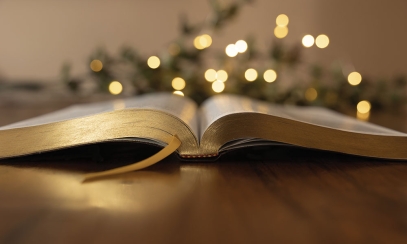
Oh, No! I Gotta Go!
How to Deal With Transitions You Don’t Want
How to Deal With Transitions You Don’t Want
Transitions are difficult. A few years ago, I moved from St Mary’s Parish in Westphalia to St. Joseph Church in Howell.
The logistics of the move were tough, but what was even tougher was that part of me did not want to go. The bishop had asked me to consider the move. There were good reasons for it, but I was comfortable where I was. I loved my parish. And there were other priests who could do a much better job at St. Joseph Church! But I had to ask the Lord whether or not he wanted me to move. It was a tough question; I was thinking, “What if he says YES?!!”
I did not give the bishop an answer right away. I thought, maybe he’ll find someone else. He didn’t. I was opening my mail and was reading a wonderful letter from a parishioner. What was amazing was that the letter contained a prayer asking St. Joseph’s help in discernment. When I saw it, my heart was touched and I prayed, “Well, St. Joseph, if I am to go to St. Joseph Parish I need a little help here! I just do not know. You made a difficult move in coming to Bethlehem and taking Jesus and Mary to Egypt, so ask God to help me, too.” No sooner had I finished the prayer than the secretary called from the front desk.
“Father Bill, the bishop is on the line. He wants to speak with you.”
Wow! God sure does not waste time! The bishop was calling to see if I had made a decision. It was time for me to die to self and say “yes” to God.
Dying is difficult, but Jesus promises us that it leads to new life.
My transition helped me die to self and rise in ways I never thought possible. I discovered in a new way the power of Christ’s cross and resurrection. That power was at work in me and in the community of St. Joseph. They had not had a new priest for more than 30 years. Transition is always difficult, for the shadow of death is present in every change. Yet there is new life in every transition. The shadow of death gives way to the brilliant light of the resurrection and its promise of hope.
This has been God’s plan from the beginning. In our original fall from grace through disobedience, God had a plan to restore us to life.
Remember Israel’s move out of Egypt? God told them to get ready to move. He told them that it was so important that they were to make that month the first month of their calendar. They were not to forget it! (Read Exodus, Chapter 12)
This was very big! Some may not have wanted to go, but if they wanted freedom, they had to obey the Lord. The feast of Passover commemorates this transition from slavery and death to new life.
Passover foreshadowed what Jesus did and does for us. In dying he destroyed our death, by rising he restored our life! We call this saving mystery the paschal mystery. It is what we celebrate and remember at every Mass and sacrament.
All the transitions of our lives – all the dyings and risings – have Christ’s dying and rising at their foundation. Our transitions are connected and given meaning by Christ’s death and resurrection. We literally plunge into that mystery at our baptism.
Our challenge this month is to see the paschal mystery at work in the transitions of our lives. We may not have made this connection before. The stuff of life and the business of transitions can prevent us from seeing its deeper meaning and gift. We may get blocked by the disappointment concerning changes we do not like. Change can be good or bad. It depends how we let “changes” change us. We can either surrender and grow in faith and trust, or we can fight and grumble and complain like the Israelites did in the desert. Some of them wanted to go back to Egypt! Things did not end too well for them. They were stuck in death, but God wanted them to pass through death to new life.
That is what God wants for us all. Every little transition in our lives can prepare us for the BIG transition, our final transition from this life into eternity.
Spiritual exercises for this month:
Think about the various figures in our faith and consider the transitions they made. Pick one and spend about 20 minutes considering their transitions. Think about their response to God and how you can respond in a similar way. Here are some suggestions for meditation: Abraham and Sarah – read Gen. 12, Joseph – read Gen. 37-50, Moses – read Ex 1-17, Mary and Joseph – read Matt 2, Jesus’ transition from private to public ministry – read Luke 3-4, and Jesus’ final days – read John 11-19.
The third exercise is for those who like to get their hands dirty. Take a seed of your favorite flower or vegetable and plant it. See what happens. Read John 12:24. Reflect on the experience of the seed and its transition and transformation. That is a natural sign of the paschal mystery.
Write down and describe one transition in your life. How did it cause you to die? How did God bring you new life?



